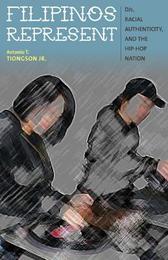
|
Filipinos Represent: DJs, Racial Authenticity, and the Hip-hop Nation
Paperback / softback
Main Details
| Title |
Filipinos Represent: DJs, Racial Authenticity, and the Hip-hop Nation
|
| Authors and Contributors |
By (author) Antonio T. Tiongson Jr.
|
| Physical Properties |
| Format:Paperback / softback | | Pages:152 | | Dimensions(mm): Height 216,Width 140 |
|
| Category/Genre | Rap and Hip-Hop |
|---|
| ISBN/Barcode |
9780816679393
|
| Classifications | Dewey:305.89921073 305.89921073 |
|---|
| Audience | | General | | Professional & Vocational | |
|---|
|
Publishing Details |
| Publisher |
University of Minnesota Press
|
| Imprint |
University of Minnesota Press
|
| Publication Date |
1 July 2013 |
| Publication Country |
United States
|
Description
The "Hip-hop Nation" has been scouted, staked out, and settled by journalists and scholars alike. Antonio T. Tiongson Jr. steps into this well-mapped territory with questions aimed at interrogating how nation is conceptualized within the context of hip-hop. What happens, Tiongson asks, to notions of authenticity based on hip-hop's apparent blackness when Filipino youth make hip-hop their own?
Author Biography
Antonio T. Tiongson Jr. is assistant professor of American studies at the University of New Mexico. He is coeditor of Positively No Filipinos Allowed: Building Communities and Discourse.
ReviewsThis book offers a compelling account of Filipino American DJ culture as a site for negotiating cultural authenticity, racial identity, and gender politics. Antonio T. Tiongson Jr. gives us a highly engaging and nuanced critique of what is at stake when young Filipino Americans enter the 'Hip-hop nation' and rethink Filipinoness in the post-Civil Rights era. It will be of interest to anyone grappling with questions of interracial solidarity, colorblindness, diasporic culture, and globalization that loom large today.-Sunaina Maira, University of California, Davis Filipinos Represent boldly asks what is at stake in defining the public meanings of hip-hop, identifying the stakes of hip-hop as an ethnic and racial practice that elucidates how Filipino American DJs experience race. Particularly compelling about Tiongson Jr.'s research are the interviews he provides with practitioners of the craft. Their narratives and his contextualization of what meanings accrue around these symbols and performative modes are rich and nuanced.-Anita Mannur, Miami University of Ohio
|